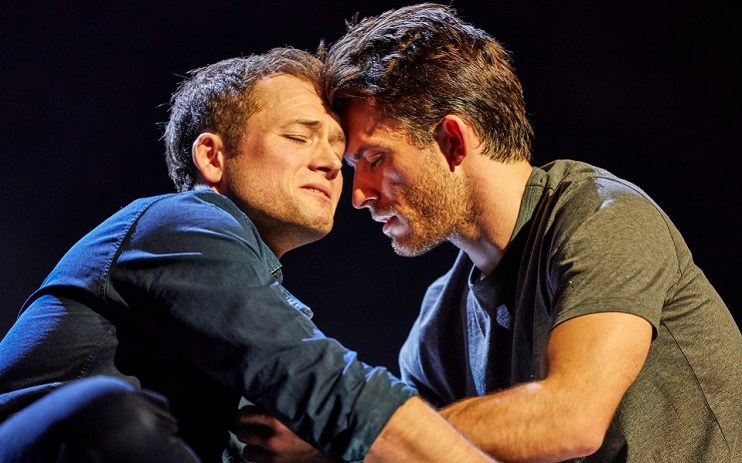Cock review: Bridgerton’s new leading man has a sexy existential crisis

This stylish new version of 2009’s queer breakthrough play Cock asks why we define ourselves by the people we have sex with. The high-budget production is a million miles away from the play’s humble roots Upstairs at the Royal Court, where it premiered to 80 people, and director Marianne Elliott takes full advantage of the move to the West End.
In terms of star power, this is the West End opening of the year so far, with Bridgerton lead Jonathan Bailey appearing alongside Rocketman’s Taron Egerton. Thankfully Elliott’s production lives up to the show’s prestige – it’s a seminal LGBTQ text by Doctor Foster writer Mike Bartlett – as well as the cultural cache of its leading men.
With its luxurious, silver-panelled set featuring shiny, revolving spaceship doors, Cock is beautiful to watch, with scenes shimmering in red and blue washes. But the experimental look and feel – there are no props – serves a dual purpose, accentuating the coldness and despair of the characters and their feelings about one another. The bold, animalistic choreography brought to mind Benedict Cumberbatch’s Frankenstein at the National Theatre; not so much style over substance as style changing substance. The play’s sex scenes don’t even require the actors to touch one another or take their clothes off to feel explosive.

This beautiful existential wasteland feels like it could be a modern take on Beckett. The main characters John and M have been in a stale relationship for God knows how long, until W, played by Jade Anouka, throws up questions about John’s sexuality and identity.
Egerton and Bailey brilliantly convey the contradictory feelings of bitterness and lust experienced during a relationship break down. When they kiss, there’s pin drop silence, and watching them intertwine and contort their bodies together is hypnotic.
Bailey’s a pro, warping his facial muscles to display John’s anguish. Egerton’s M is an intriguingly understated West End debut for the actor. He’s perhaps the most tragic character in the play, with Egerton playing him with the sort of glassy-eyed naivety that suggests he’ll struggle to survive alone. With every insult he throws in an attempt to gain control, he pushes John further away.
Playwright Mike Bartlett told City AM he feared the play’s themes would have dated but realised labels are more contentious now than ever. He’s right, they are: but the conversation has progressed uncomfortably. The division between trans people, for instance, and their controversial critics have only attracted more publicity and louder voices.
In another world an updated version of this play might have been about transness. The conversation about identity is of course pertinent within all aspects of queer culture – and culture more broadly – but the elephant in the room is that, while these issues today disproportionately affect trans people, their voices aren’t heard here.
Still, more than the heady questions of who you sleep with, and what that means, Elliott’s production poses existential questions for us all about how we communicate, what we communicate, and how our relationships impact our worldview.
If that all sounds too deep, Cock’s your chance to get down and dirty with Bridgerton’s new hunk.
Cock plays at the Ambassador’s Theatre until June 4
